Extradition of criminals: India
This is a collection of articles archived for the excellence of their content. |
Contents |
India's extradition laws
The basics explained
India has extradition treaties with 37 nations, Mar 27 2017: The Times of India
February 17, 2018: The Times of India
Extradition is governed by the Indian Extradition Act, 1962 India has extradition treaties with 47 countries. Which means these countries generally accept that the offender will be treated as criminal in both countries. India also has extradition arrangements with 9 countries, which means India and these countries agree to assist mutually each other in “legal procedures”.
What is extradition?
Extradition is simply the surrender of a criminal to one country by another. It also helps in maintaining the territoriality of the penal code, which says that a country should not apply its criminal law to a person who committed an offence outside its territories except when the crime is related to a particular country's national interest. The process is regulated by treaties between the two countries.
What are the internationally accepted extradition conditions?
There is a general consensus about a few conditions of extradition. The crime should fulfill the criterion of dual criminality it's a punishable offence in both countries. For instance, homosexuality might be a crime in a country while it is accepted in another. In that case, the first country cannot request the second to extradite a person who is charged with a homosexuality related offence. Political criminals are generally not extradited. Some countries refuse to extradite if the kind of expected punishment is abolished or is not administered in their own territories.
How does British extradition law work?
UK has three types of extradition arrangements. The first deals with European arrest warrants, the second applies to countries with which the UK has international extradi tion arrangements and lastly those with which the UK doesn't have extradition treaties or arrangements. India falls in the second category and hence Vijay Mallya will get extradited according to this process if it happens at all. The first step in this process is an extradition request made to the secretary of state, who then decides whether to cer tify the request or reject it. In Mallya's case, the secretary of state has certified his extradition. His case will now go to a district court and if the judge is satisfied that enough information has been provided, he she can issue an arrest warrant which will follow a preliminary hearing succeeded by an extradition hearing. If convinced that the person has committed an offence that qualifies for extradition, the judge rule so. This will then be passed on to the secretary of state who would order extradition. Mallya or the Indian government can go to the high court or Supreme Court if they are not satisfied with the order.
What are India's extradition laws?
In India, the Extradition Act, 1962 regulates the surrender of a person to another country or the request for arrest of a person in a foreign land.The Act specifies a list of extradition offences -an offence provided for in the extradition treaty with that state. The process has to be initiated by the central government. As we have extradition treaties with only 37 countries and extradition arrangements with another 8 countries, where there is no treaty the central government is empowered to take action by releasing a notification and treating any convention to which India and the foreign country are parties as the extradition treaty . If the extradition request has come from two or more countries, the government has the rights to decide which of them is the fittest for the request.
In what situations can the government deny extradition?
If the government finds the case trivial and if it thinks that surrendering of the person is not being made in good faith or in the interests of justice or for political reasons, it can deny the request. If the surrender according to the requesting country's own law is barred by time, the person cannot be extradited from India. If the government feels that the person will be charged with an offence not mentioned in the extradition treaty, it can stop the process. If the person is serving a jail term or is accused of an offence on Indian soil, which is different from the offence for which he or she is wanted abroad, the extradition process can be stopped.
The European Convention on human rights

See graphic:
The Abu Salem case and the European convention on human rights
Countries India has extradition treaties with, 2018
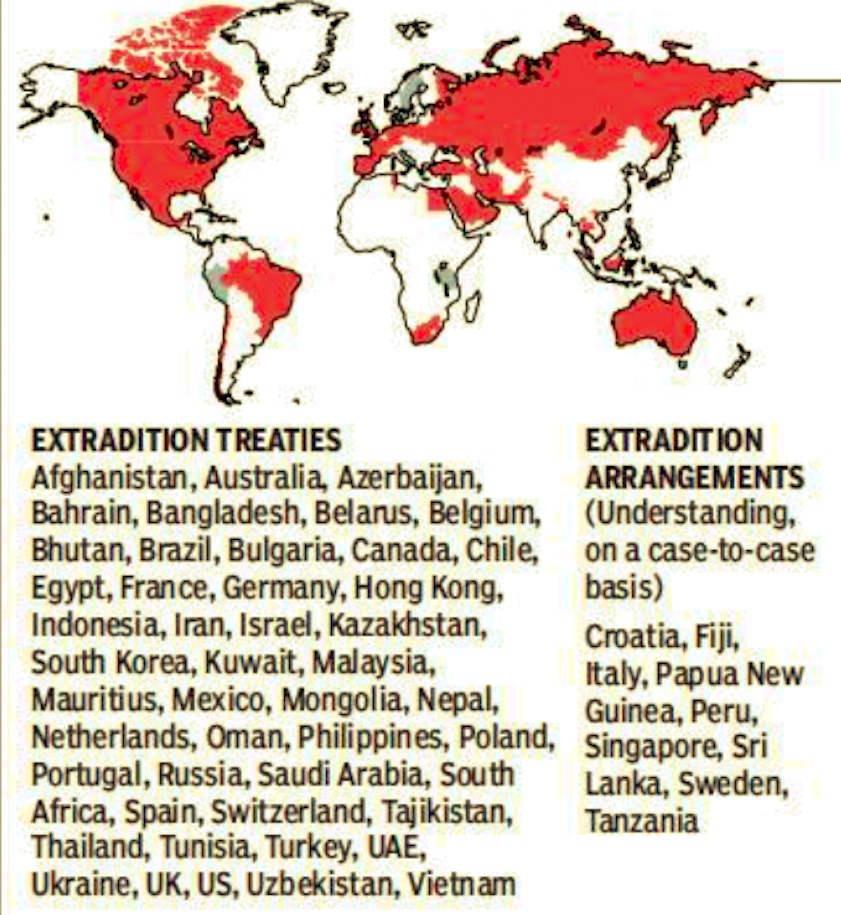
From: February 19, 2018: The Times of India

From: February 17, 2018: The Times of India
See graphics:
Countries India has extradition treaties with, and extradition arrangements, as in February 2018
The countries with which India has extradition treaties or arrangements
Criminals extradited to or by India
1993-2008

From: February 17, 2018: The Times of India
See graphic:
The infamous who came back to India and those who did not, country-wise, 1993-2008
2002-16: Criminals extradited to India
February 19, 2018: The Times of India

From: February 17, 2018: The Times of India
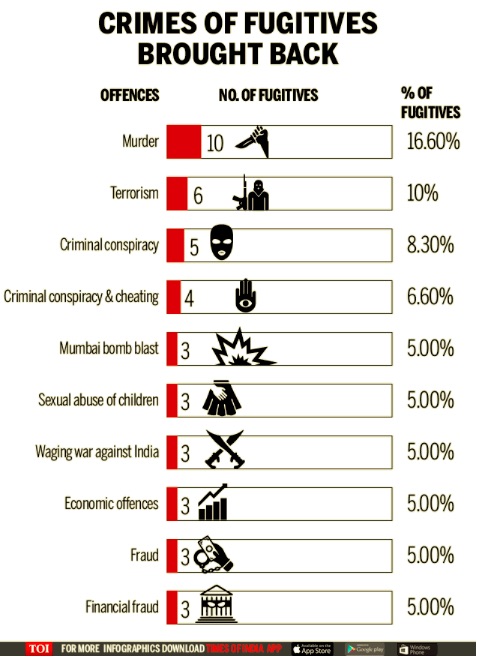
From: February 17, 2018: The Times of India
See graphics:
Criminals extradited to India, 2002-16
Crimes of fugitives brought back to India
How many persons have been extradited to India, for what crimes?
Between 2002 and December 7, 2016, (latest data available), 62 fugitives have been extradited by foreign governments to India, the majority were Indian citizens.
2012-17: Criminals extradited to and from India
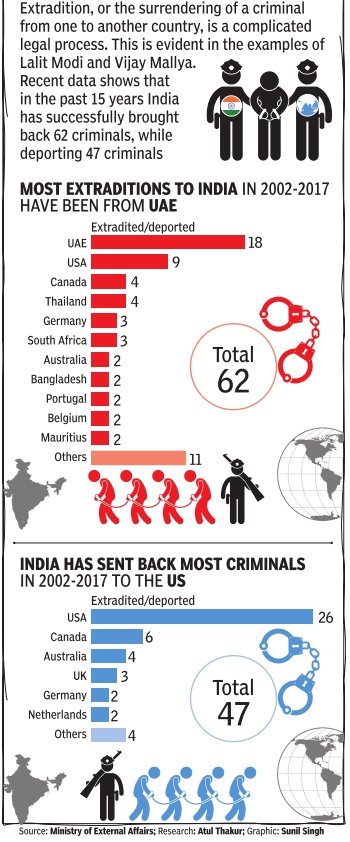
From The Times of India , October 14, 2017
See graphic:
Criminals extradited to and from India and other countries, 2012-17
2018: Pending extraditions
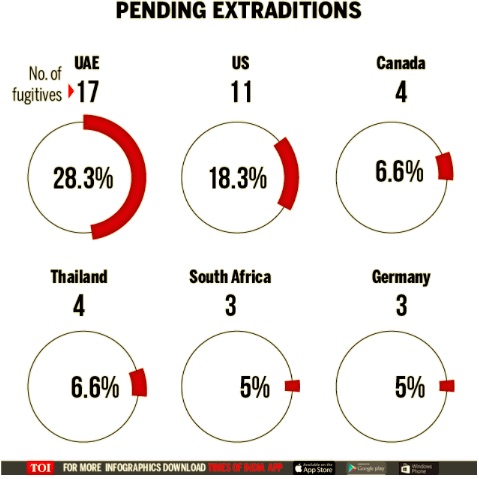
From: February 17, 2018: The Times of India
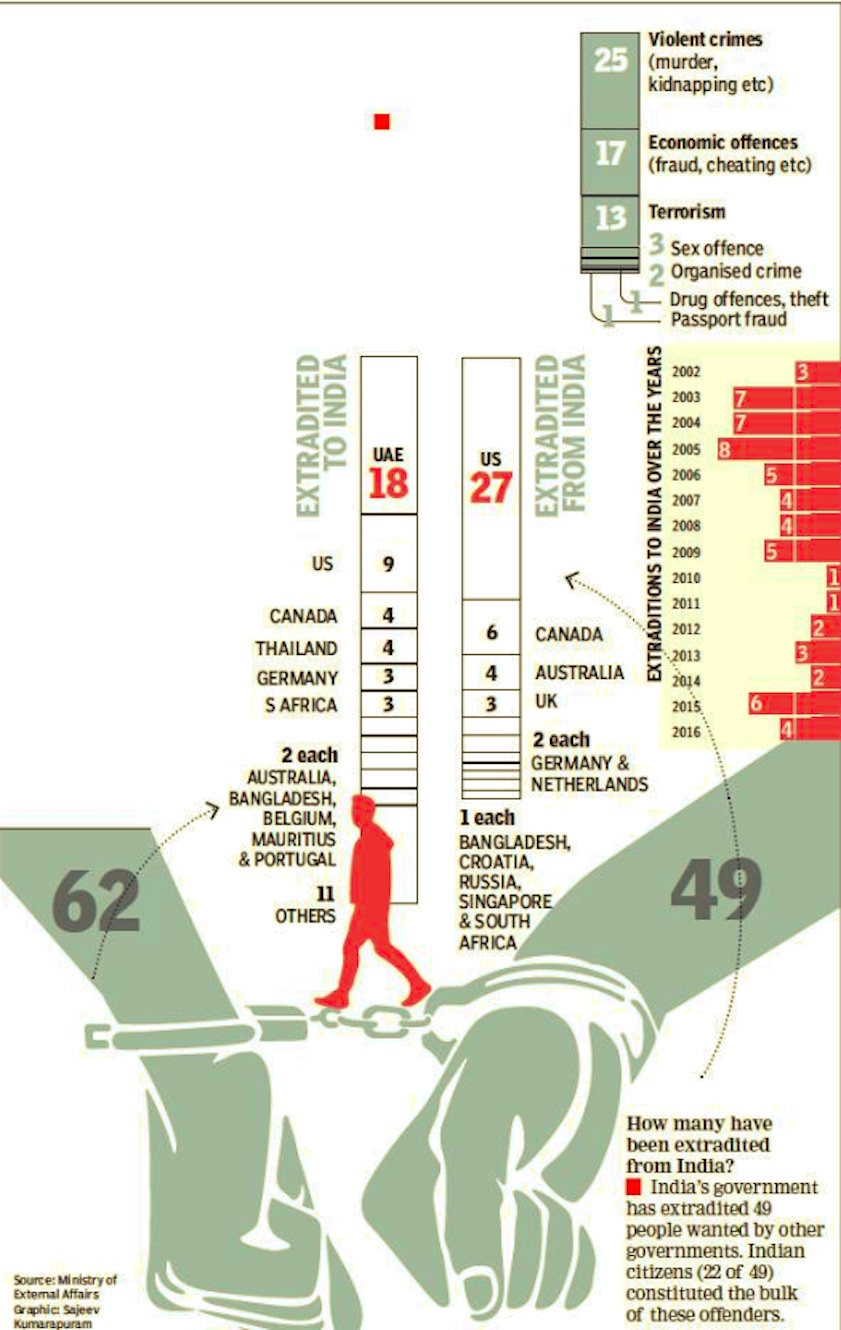
From: February 19, 2018: The Times of India
See graphics:
Pending extraditions, country-wise, as in February 2018
The number of persons extradited to India and from India, as in February 2018
Criminals extradited to India by…
The UAE

From: Neeraj Chauhan & Indrani Bagchi, Extradited by UAE, ‘fixer’ in Agusta scam lands in Delhi, December 5, 2018: The Times of India
Christian Michel May Throw New Light On Scandal
In what marks one of the biggest successes for the Modi government in getting persons charged with corruption extradited, Christian James Michel, a European middleman at the heart of the UPA-era AgustaWestland chopper scam, was brought to India.
His extradition from the UAE follows an adverse order of a Dubai court. Indian intelligence sources claimed the development could also be seen as linked to India’s assistance in tracking Dubai’s runaway Princess Latifa.
Michel, who was given the codename ‘Unicorn’ in the extradition operation, was brought in a Gulf Stream jet that landed at 10.35 pm in the technical area of Delhi airport. He was arrested by the CBI upon his arrival and is expected to be taken to the CBI headquarters after a medical checkup. His ‘panchnama’ was done at the airport itself with custom officials as witnesses.
He is likely to be produced before a court in Patiala House on Wednesday afternoon.
CBI officials said Michel would be examined and confronted with documents recovered during raids by Swiss authorities indicating the bribes paid by him to Indian officials and politicians.
India had requested Michel’s extradition 19 months ago, and the UAE completed all its legal formalities this week before agreeing to extradite him to India. An Interpol red notice was issued against Michel on November 2015.
It is a big moment for India’s law enforcement and diplomacy. The process of Michel’s extradition picked up a year ago with top-level efforts led by PM Narendra Modi and NSA Ajit Doval, involving some deep diplomacy with many players in Abu Dhabi and Dubai.
As soon as Michel, 57, landed in New Delhi, a top government source said, “We expect that Michel’s questioning will throw new light on the AgustaWestland case. We might see new information regarding the entire ecosystem of corruption, as well as reveal the people who wanted Michel to remain in the UAE and not come to India.”
UAE, USA, Canada, Thailand, S. Africa, Germany…
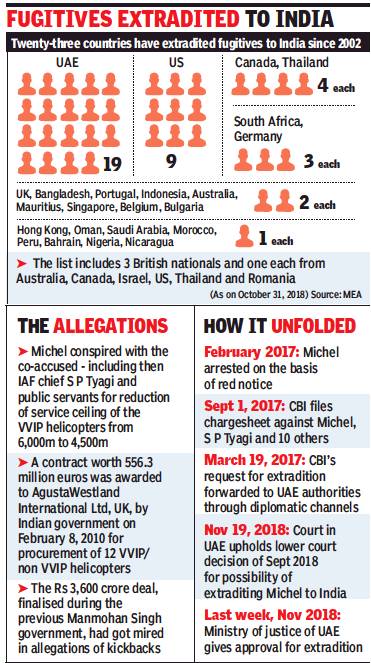
ii) Christian James Michel’s extradition from the UAE in December 2018
From: Neeraj Chauhan & Indrani Bagchi, Extradition significant as Michel a British citizen, December 5, 2018: The Times of India
Christian James Michel, a middleman linked to the UPA-era AgustaWestland chopper scam, landed in Delhi on Tuesday night following his extradition from the UAE.
Michel was allegedly paid €42 million (Rs 295 crore) bribe by Anglo-Italian firm AgustaWestland to pay off Indian politicians, bureaucrats and defence ministry personnel to swing the Rs 3,600 crore deal for supply of 12 VVIP choppers in AgustaWestland’s favour. Michel is one of three middlemen being probed in the case, besides Guido Haschke and Carlo Gerosa, by the Enforcement Directorate and CBI.
Since the Bofors case, this is one of the more significant instances when India actually managed to secure extradition of a high-profile fugitive. After a series of bad news on this front, from Vijay Mallya to Nirav Modi, Tuesday’s development lifted the mood in the government.
“We worked with the prosecutors in the UAE, the judiciary and the government in that country. We had to complete the entire judicial process,” the source said. But what really worked was the deepened strategic relationship that has grown between UAE and India, helmed by Modi and UAE’s Crown Prince Mohammed bin Zayed. The extradition is all the more significant since Michel is a British citizen and the UAE dismissed requests that as a British national, he could not be sent to India.
The Court of Cassation in Dubai had on November 19 upheld a lower court order clearing the extradition order. Michel, while rejecting the charges, had argued that India had “dilapidated jails” and he would be forced to frame politicians. These arguments were rejected by the UAE court, which asked the ministry of justice there to decide on extradition.
A CBI team led by special investigation team joint director Sai Manohar had flown to Dubai last week to complete the formalities of his extradition. CBI issued a statement late Tuesday saying the extradition operation was coordinated by interim director Nageswara Rao under the guidance of Doval.
The development will allow BJP to put the spotlight on corruption under UPA, as the scandal dates back to the Congress tenure. This is a political bonus in the season of polls, particularly with general elections around the corner.
Red Corner Notices issued for India
Why they are ignored
Neeraj Chauhan, Why India’s red notice requests gather dust, November 19, 2018: The Times of India
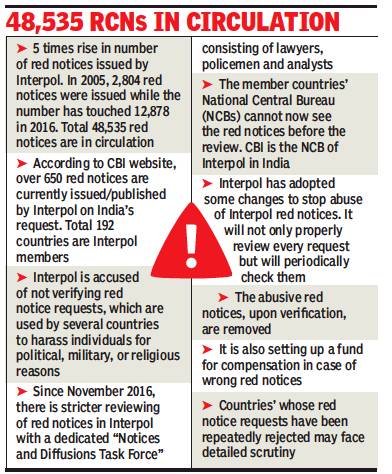
From: Neeraj Chauhan, Why India’s red notice requests gather dust, November 19, 2018: The Times of India
Stricter Scrutiny Delaying RCNs Against Mallya, NiMo & Choksi
India’s requests for Interpol red notices against fugitives like Vijay Mallya, Lalit Modi, Zakir Naik and Mehul Choksi have been inordinately delayed due to the international police body’s stricter scrutiny of such demands following allegations of misuse of the system.
Interacting with Indian officials recently on the sidelines of an event, Interpol secretary general Jurgen Stock said for the past few years, the global body had faced allegations of lax scrutiny of red notice requests by member countries and some misused the system for political, religious and military reasons or for curbing freedom of expression.
Stock, a CBI officer said, claimed that as part of the review, there was now a dedicated ‘task force’ which scrutinised every red notice request. Since 2017, Interpol has reviewed over 40,000 red notices.
Interestingly, the Interpol secretary general even cited a fine imposed on the body for issuing red notice against a wrong person. TOI wrote to Interpol seeking details of the case in which it was asked to pay fine. It didn’t deny the fine but refused to divulge details.
Responding to Interpol’s apprehensions, CBI, NIA and ED officials told Stock that their requests were backed by chargesheets and witness testimonies filed under India’s Criminal Procedure Code, Indian Penal Code and other laws and courts had issued non-bailable warrants against these fugitives.
The CBI, which acts as the National Central Bureau of Interpol in India, even offered to send a team to the global body’s headquarters in Lyon, France, to explain the procedure so that pending requests could be expedited. According to sources, Interpol said it wanted to send a team to India to understand the process.
The discussions, sources said, took place before the feud between CBI director Alok Verma and special director Rakesh Asthana came out in the open on October 23. Owing to the deadlock in CBI, the Interpol team’s visit is stuck.
“Interpol has an important role to play in the fight against global crime, but unfortunately it has been misused by a number of countries to target activists, journalists and refugees. Fair Trials has campaigned for changes to stop this from being the case for a number of years. It’s great that Interpol has shown a willingness to listen, and we welcome the changes introduced so far, but there’s still so much work to be done,” Alex Mik, campaigns and networks director of UK-based Fair Trials International, told TOI. Fair Trials has regularly intervened in wrong arrests or unverified red notices on the request of Interpol member countries.
Interpol’s constitution says it is “strictly forbidden for the organisation to undertake any intervention or activities of a political, military, religious or racial character”. However, it largely relies on the information provided by its national bureaus in member countries. In India’s case, accused like Zakir Naik and Mehul Choksi have claimed religious and political persecution. Choksi’s case is being heard by the Commission for the Control of Interpol Files, an independent body which reviews specific red notice requests.
Jails in India: safety of
2018: UK court says Tihar safe for extraditing fugitives
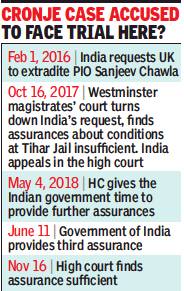
From: Naomi Canton, In big win for India, UK court says Tihar safe for extraditing fugitive, November 17, 2018: The Times of India
A UK court has made a landmark ruling that the Tihar prison complex in Delhi is safe to extradite Indian fugitives to. This judgment, in the case of cricket-fixing accused Sanjeev Chawla, could have huge consequences for the Vijay Mallya extradition case.
In a judgment handed down in the high court in London, Lord Justice Leggatt and Mr Justice Dingemans ruled that the Tihar prison complex “posed no risk” to Sanjeev Kumar Chawla — an Indian-origin British citizen accused of fixing international cricket matches (the Hansie Cronje fix) — after receiving a third assurance from the Indian government about his proposed treatment there.
Now that the Indian government has successfully appealed the decision to discharge Chawla from extradition proceedings, the case will go back to Westminster magistrates’ court for a fresh decision. The secretary of state makes the final decision on whether to order extradition but that decision can be appealed in the high court. A further appeal can be made in the Supreme Court in London.